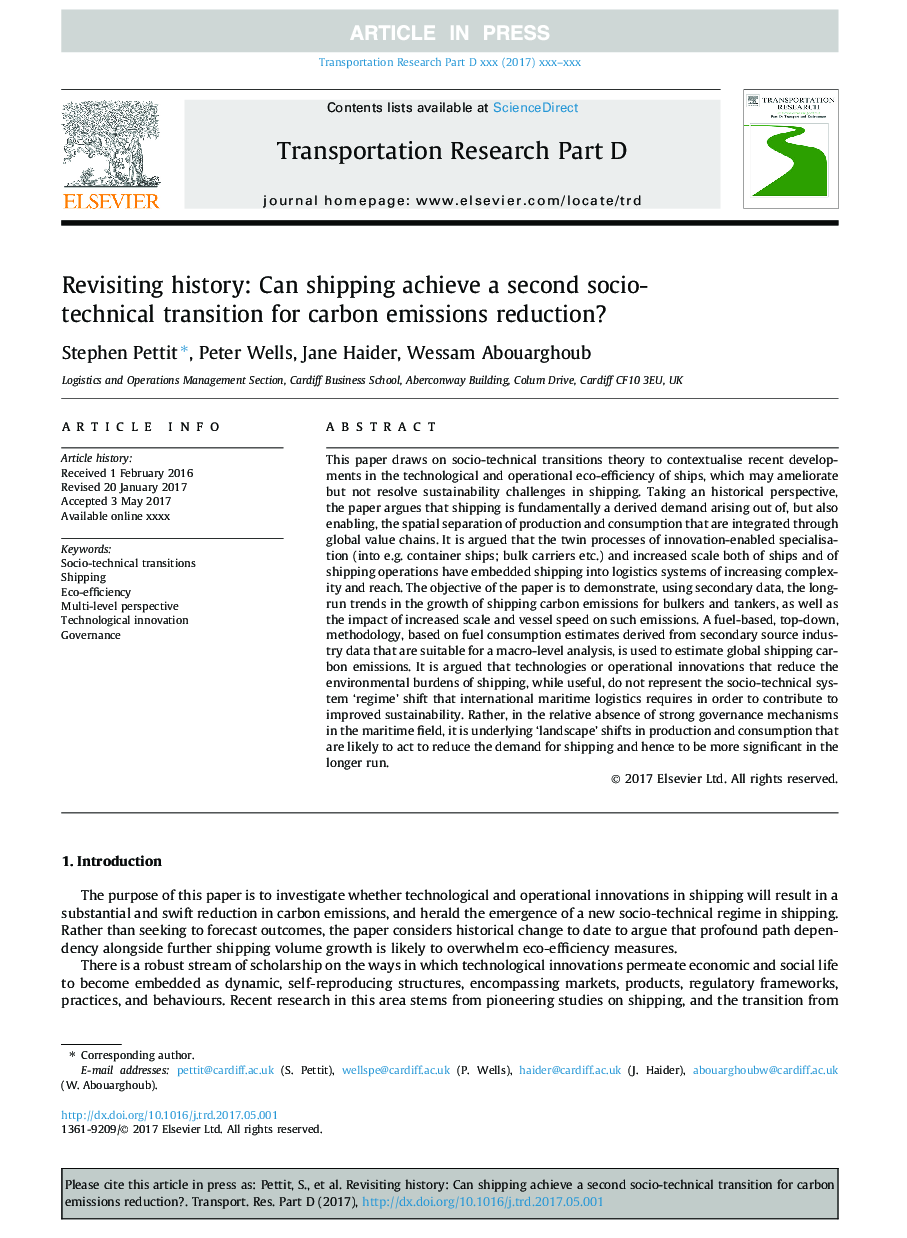| کد مقاله | کد نشریه | سال انتشار | مقاله انگلیسی | نسخه تمام متن |
|---|---|---|---|---|
| 7499232 | 1485866 | 2018 | 16 صفحه PDF | دانلود رایگان |
عنوان انگلیسی مقاله ISI
Revisiting history: Can shipping achieve a second socio-technical transition for carbon emissions reduction?
ترجمه فارسی عنوان
بازخوانی تاریخ: آیا حمل و نقل به یک انتقال دوم اجتماعی-فنی برای کاهش انتشار کربن می انجامد؟
دانلود مقاله + سفارش ترجمه
دانلود مقاله ISI انگلیسی
رایگان برای ایرانیان
کلمات کلیدی
انتقال اجتماعی و فنی، حمل دریایی، بهره وری اقتصادی، چشم انداز چند مرحله ای، نوآوری تکنولوژیک، حکومت،
ترجمه چکیده
این مقاله بر تئوری تغییرات اجتماعی و تکنولوژیکی تاکید می کند تا تحولات اخیر در بهره وری فنی و عملیاتی کشتی ها را محاسبه کند که ممکن است چالش های پاکسازی را در حمل و نقل بهبود بخشید اما حل آن را حل نمی کند. با توجه به دیدگاه تاریخی، این مقاله استدلال می کند که حمل و نقل اساسا یک تقاضای مشتق شده است که ناشی از جداسازی فضایی تولید و مصرف است که از طریق زنجیره ارزش جهانی به هم پیوسته است، اما همچنین قادر می سازد. استدلال می شود که فرآیندهای دوگانه تخصص ویژه نوآوری (به عنوان مثال کشتی های کانتینر، حامل های باربری و غیره) و افزایش مقیاس هر دو کشتی و عملیات حمل و نقل، حمل و نقل را به سیستم های تدارکاتی افزایش پیچیدگی و رسیدن به دست آورده اند. هدف مقاله، نشان دادن استفاده از داده های ثانویه، روند بلند مدت در رشد انتشار کربن حمل و نقل برای بولکر ها و تانکر ها، و همچنین تاثیر افزایش مقیاس و سرعت کشتی در چنین انتشار است. یک روش مبتنی بر سوخت، مبتنی بر بالا به پایین، براساس برآوردهای مصرف سوخت، که از داده های صنعت ثانویه که مناسب برای تجزیه و تحلیل سطح کلان هستند، برای ارزیابی انتشار جهانی کربن حمل و نقل استفاده می شود. استدلال می شود که فناوری ها یا نوآوری های عملیاتی که سبب کاهش بار زیست محیطی حمل و نقل می شوند، در حالی که مفید هستند، نشان نمی دهند که تغییر رژیم سیستم اجتماعی و فنی که نیاز به تدارکات دریایی بین المللی برای کمک به بهبود پایداری دارد. در عوض فقدان نسبی مکانیسم های حکومت قوی در حوزه دریایی، تغییرات اساسی در تولید و مصرف است که احتمالا برای کاهش تقاضا برای حمل و نقل و در نتیجه در جهت بلندمدت مهم تر است.
موضوعات مرتبط
علوم زیستی و بیوفناوری
علوم محیط زیست
علوم زیست محیطی (عمومی)
چکیده انگلیسی
This paper draws on socio-technical transitions theory to contextualise recent developments in the technological and operational eco-efficiency of ships, which may ameliorate but not resolve sustainability challenges in shipping. Taking an historical perspective, the paper argues that shipping is fundamentally a derived demand arising out of, but also enabling, the spatial separation of production and consumption that are integrated through global value chains. It is argued that the twin processes of innovation-enabled specialisation (into e.g. container ships; bulk carriers etc.) and increased scale both of ships and of shipping operations have embedded shipping into logistics systems of increasing complexity and reach. The objective of the paper is to demonstrate, using secondary data, the long-run trends in the growth of shipping carbon emissions for bulkers and tankers, as well as the impact of increased scale and vessel speed on such emissions. A fuel-based, top-down, methodology, based on fuel consumption estimates derived from secondary source industry data that are suitable for a macro-level analysis, is used to estimate global shipping carbon emissions. It is argued that technologies or operational innovations that reduce the environmental burdens of shipping, while useful, do not represent the socio-technical system 'regime' shift that international maritime logistics requires in order to contribute to improved sustainability. Rather, in the relative absence of strong governance mechanisms in the maritime field, it is underlying 'landscape' shifts in production and consumption that are likely to act to reduce the demand for shipping and hence to be more significant in the longer run.
ناشر
Database: Elsevier - ScienceDirect (ساینس دایرکت)
Journal: Transportation Research Part D: Transport and Environment - Volume 58, January 2018, Pages 292-307
Journal: Transportation Research Part D: Transport and Environment - Volume 58, January 2018, Pages 292-307
نویسندگان
Stephen Pettit, Peter Wells, Jane Haider, Wessam Abouarghoub,
